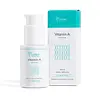What's inside
What's inside
 Key Ingredients
Key Ingredients

 Benefits
Benefits

 Concerns
Concerns

 Ingredients Side-by-side
Ingredients Side-by-side

Water
Skin ConditioningPropanediol
SolventDimethicone
EmollientCetearyl Ethylhexanoate
EmollientAlcohol Denat.
AntimicrobialDipropylene Glycol
HumectantAmmonium Polyacryloyldimethyl Taurate
Emulsion StabilisingHydrogenated Lecithin
EmulsifyingAllyl Methacrylates Crosspolymer
Emulsion StabilisingPhenoxyethanol
PreservativeCaprylyl Glycol
EmollientIsopropyl Myristate
EmollientRetinol
Skin ConditioningPolysorbate 20
EmulsifyingSodium Citrate
BufferingBoswellia Serrata Resin Extract
SmoothingDimethiconol
EmollientTrisodium Ethylenediamine Disuccinate
Bisabolol
MaskingCitric Acid
BufferingBHT
AntioxidantPropyl Gallate
AntioxidantWater, Propanediol, Dimethicone, Cetearyl Ethylhexanoate, Alcohol Denat., Dipropylene Glycol, Ammonium Polyacryloyldimethyl Taurate, Hydrogenated Lecithin, Allyl Methacrylates Crosspolymer, Phenoxyethanol, Caprylyl Glycol, Isopropyl Myristate, Retinol, Polysorbate 20, Sodium Citrate, Boswellia Serrata Resin Extract, Dimethiconol, Trisodium Ethylenediamine Disuccinate, Bisabolol, Citric Acid, BHT, Propyl Gallate
Water
Skin ConditioningPentylene Glycol
Skin ConditioningGlycerin
HumectantTricaprylin
MaskingDimethyl Isosorbide
SolventCandelilla/Jojoba/Rice Bran Polyglyceryl-3 Esters
EmulsifyingGlyceryl Stearate
EmollientPanthenol
Skin ConditioningCaprylyl Caprylate/Caprate
EmollientBakuchiol
AntimicrobialHydroxypinacolone Retinoate
Skin ConditioningSodium Hyaluronate
HumectantHelianthus Annuus Seed Oil
EmollientRetinol
Skin ConditioningRetinal
Skin ConditioningAsiaticoside
AntioxidantMadecassic Acid
Skin ConditioningAsiatic Acid
Skin ConditioningPropylheptyl Caprylate
EmollientDisodium Cetearyl Sulfosuccinate
CleansingCetearyl Alcohol
EmollientSodium Stearoyl Lactylate
EmulsifyingAllantoin
Skin ConditioningHydroxypropyl Cyclodextrin
MaskingTocopherol
AntioxidantSodium Phytate
Xanthan Gum
EmulsifyingCitric Acid
BufferingWater, Pentylene Glycol, Glycerin, Tricaprylin, Dimethyl Isosorbide, Candelilla/Jojoba/Rice Bran Polyglyceryl-3 Esters, Glyceryl Stearate, Panthenol, Caprylyl Caprylate/Caprate, Bakuchiol, Hydroxypinacolone Retinoate, Sodium Hyaluronate, Helianthus Annuus Seed Oil, Retinol, Retinal, Asiaticoside, Madecassic Acid, Asiatic Acid, Propylheptyl Caprylate, Disodium Cetearyl Sulfosuccinate, Cetearyl Alcohol, Sodium Stearoyl Lactylate, Allantoin, Hydroxypropyl Cyclodextrin, Tocopherol, Sodium Phytate, Xanthan Gum, Citric Acid
 Reviews
Reviews

Ingredients Explained
These ingredients are found in both products.
Ingredients higher up in an ingredient list are typically present in a larger amount.
Citric Acid is an alpha hydroxy acid (AHA) naturally found in citrus fruits like oranges, lemons, and limes.
Like other AHAs, citric acid can exfoliate skin by breaking down the bonds that hold dead skin cells together. This helps reveal smoother and brighter skin underneath.
However, this exfoliating effect only happens at high concentrations (20%) which can be hard to find in cosmetic products.
Due to this, citric acid is usually included in small amounts as a pH adjuster. This helps keep products slightly more acidic and compatible with skin's natural pH.
In skincare formulas, citric acid can:
While it can provide some skin benefits, research shows lactic acid and glycolic acid are generally more effective and less irritating exfoliants.
Most citric acid used in skincare today is made by fermenting sugars (usually from molasses). This synthetic version is identical to the natural citrus form but easier to stabilize and use in formulations.
Read more about some other popular AHA's here:
Learn more about Citric AcidRetinol is a gold-standard ingredient for anti-aging. It is a form of Vitamin A and belongs to the class of retinoids that also includes tretinoin.
Why is retinol famous?
It has the most scientific studies backing up its skin benefits out of all the non-prescription ingredients.
Retinol is proven to:
This is why retinol is effective at removing wrinkles, fading dark spots, treating acne, and reducing the appearance of pores.
Studies show retinol is less effective when exposed to UV. Be sure to look for appropriate packaging to keep your retinol potent (similar to Vitamin C).
Using retinol or any retinoids will increase sun-sensitivity in the first few months. Though studies show retinoids increase your skin's natural SPF with continuous use, it is best to always wear sunscreen and sun-protection.
We recommend speaking with a medical professional about using this ingredient during pregnancy.
Retinol may cause irritation in some people, so be sure to patch test. Experts recommend 'ramping up' retinol use: start using this ingredient once a week and work up to using it daily.
Read about Tretinoin
Learn more about RetinolWater. It's the most common cosmetic ingredient of all. You'll usually see it at the top of ingredient lists, meaning that it makes up the largest part of the product.
So why is it so popular? Water most often acts as a solvent - this means that it helps dissolve other ingredients into the formulation.
You'll also recognize water as that liquid we all need to stay alive. If you see this, drink a glass of water. Stay hydrated!
Learn more about Water